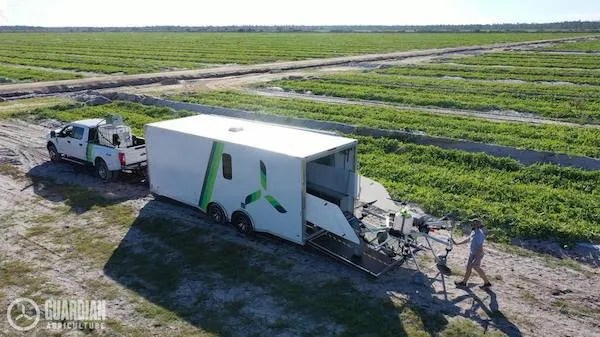Aerial input application, better known to some as “crop-dusting,” is still mostly done with low-flying planes. There has been a steady increase in both the technological capabilities and farmer adoption of drones to do this work, with company’s like Rantizo making impressive strides. A new entrant in the space, Guardian Agriculture, has developed an autonomous eVTOL (electric vertical takeoff and landing) vehicle that is sort of a hybrid of the two application methods. The company, which just closed a $10.5 million seed round, says it’s already taken $20 million in preorders for its aerial application services in California and Florida.
Guardian Agriculture’s eVTOL is about the size of a pickup truck, according to CEO and co-founder Adam Bercu. “You can call what we’re building a drone, but you can also call it a serious piece of equipment,” Bercu told Capital Press in a recent interview. Each eVTOL can autonomously spray up to 40 acres per hour, carrying as much as 200 pounds of product at a time. It can also be programmed for targeted spraying of just certain areas. Guardian says the system’s delivery is precise to within a few centimeters and can collect crop data as it goes along.
The eVTOL’s themselves will not be for sale but rather the delivery system behind Guardian’s aerial application service, which runs $10 to $45 per acre. The chemicals are premixed for the eVTOL’s automated system, cutting both time and chemical exposure. Jeff Sparks, the company’s chief operating officer, says the service will also save farmers money by spraying areas planes can’t reach, reducing the volume of chemicals sprayed unnecessarily, and helping farmers avoid legal battles related to drift.
The company has already faced some criticism about its system’s delivery precision as well as possible safety concerns. Scott Bretthauer, director of education and safety at the National Agricultural Aviation Association notes that he’s concerned that because of their physical design, drones won’t be able to deposit the volumes or droplet sizes EPA labels require for drift control. Guardian says that while small drones have often been unreliable, the company’s eVTOL is in a different class than typical drones and specifically built to provide known droplet patterns.
Bretthauer says his organization is also “very concerned about collisions.” Sparks points out that the Guardian eVTOL’s are not high-flying machines. They only travel about 10 feet above the canopy and travel at 20 to 30 mph.
The company’s $10.5 million funding round was led by Leaps by Bayer, the Pharma giant’s venture capital fund. Wilbur-Ellis’ venture arm, Cavallo Ventures, also contributed to the seed round. Learn more at Guardian Agriculture’s website HERE. (Sources: Capital Press, Forbes)







